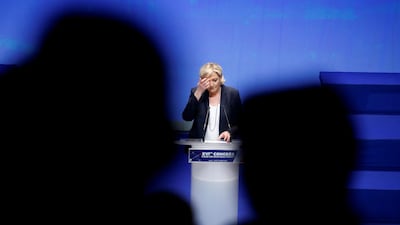Behind the cheers, standing ovations and an unopposed re-election as president of the anti-immigration, anti-Islam Front National, Marine Le Pen faces an uncertain future as France shows signs of resisting the far right's march in Europe.
At her party’s annual conference in the northern city of Lille at the weekend, Miss Le Pen unveiled a proposed new and theoretically softer name for the FN, Rassemblement National (National Rally). It was time, she said, to move from party of protest to party of government.
But the gathering coincided with an opinion poll indicating that despite the success of her close allies, the Northern League, in Italy's recent elections, and advances by extreme right groups elsewhere in Europe, more than half French voters regard the FN as a threat to democracy.
In another survey, the proportion rose to nearly two-thirds (63 per cent) who believe the FN would represent such a danger if in power. Both polls suggest support for Miss Le Pen as a future French president is also waning except among the party faithful, with only 16 per cent – against 24 per cent a year ago – believing she would make a good head of state.
At Lille, Miss Le Pen - soundly beaten by the centrist Emmanuel Macron is last year's French presidential elections - suffered further setbacks in her attempts to detoxify her party's unsavoury image.
Davy Rodriguez, deputy leader of the FN's youth wing, was suspended as a parliamentary aide after video footage appeared to show him calling a bar-room bouncer a "dirty African" and a "monkey". He has resigned from all political functions.
___________________
Wear racist badge 'like a medal', Bannon tells France's Front National
Opinion: Being called racist is a badge of shame, not honour
___________________
And the party left itself open to criticism for parading Steve Bannon, Donald Trump's former chief strategist and a leading figure of the alt-right movement in the United States, as a star speaker.
Mr Bannon told FN delegates to wear allegations of racism and xenophobia as "badges of honour – because every day we get stronger and they get weaker".
He said Miss Le Pen's party was part of a worldwide movement "bigger than France, bigger than Italy, bigger than Hungary, bigger than all of us". Even a leading FN figure, Gilbert Collard, a member of parliament, said such declarations risked the party "giving ammunition to our enemies".
Whatever Miss Le Pen thought of Mr Bannon's inflammatory words, she cannot have enjoyed hearing him describe her niece, Marion Marechal-Le Pen, as a "rising star".
Only 28, Miss Marechal-Le Pen has already served as a member of parliament and is seen as a future contender for the party leadership despite currently being on a break from politics. For the French newspaper, Le Journal du Dimanche, she was the Lille conference's "very present absentee".
Despite internal divisions – Marine Le Pen's deputy, Florian Philippot, left last year to form his own party – she retains the overwhelming support of party members.
Although generally judged to have run a poor presidential campaign against Mr Macron, she polled more than 10 million votes, a third of those cast in the second-round runoff. And even some of Marine Le Pen’s critics accept she is sincere in her efforts to reinvent the FN and expel sinister elements.
But more and more French people see her niece as a serious rival. One poll found 68 per cent of FN sympathisers would welcome Miss Marechal-Le Pen as a presidential candidate.
Senior colleagues cite anti-Semitism as the main stumbling block to the party's ambitions.
The proposed name change – a vote will be held soon on adopting Rassemblement National as the new title – is part of the intended makeover. But even here, Marine Le Pen invites controversy.
For a party anxious to shake off the trappings of fascism, racism and anti-Semitism, the name is uncomfortably close to Rassemblement National Populaire (National Popular Rally), a collaborationist movement during the Second World War.
FN members voted by only a narrow majority to consider changing a name Miss Le Pen and her most trusted allies regard as a "psychological barrier".
Marine Le Pen’s estranged father, Jean-Marie Le Pen, grandfather to Marion, condemned the planned re-baptism of the party he created in 1972 as an act of "political assassination"’.
His daughter led moves leading to his expulsion from the party in 2015 after he repeated claims that Nazi gas chambers were a mere "detail" of the war.
But he remains close to his granddaughter. Marion Marechal-Le Pen distances herself from his more extreme utterances but is even more anti-Islam than her mother and was described in 2015 by a conservative British newspaper, the Daily Mail, as the far right's poster-girl, "a vision of Aryan chic whose appearance masks her unlovely ideology".
Mr Le Pen, now 89, told France Inter radio he reserved the right to resurrect the Front National's name.
For opponents, the change is irrelevant.
"The Front National can exclude, change name, logo, wallpaper," said Bernard Griveaux, spokesman for Mr Macron's government. "They replace Jean-Marie by Marine, maybe tomorrow Marine by Marion. But at heart, nothing changes."


